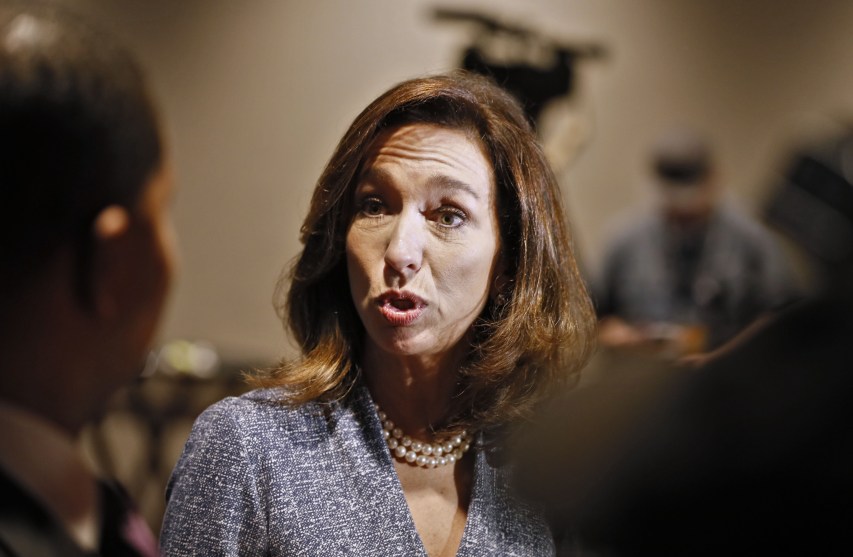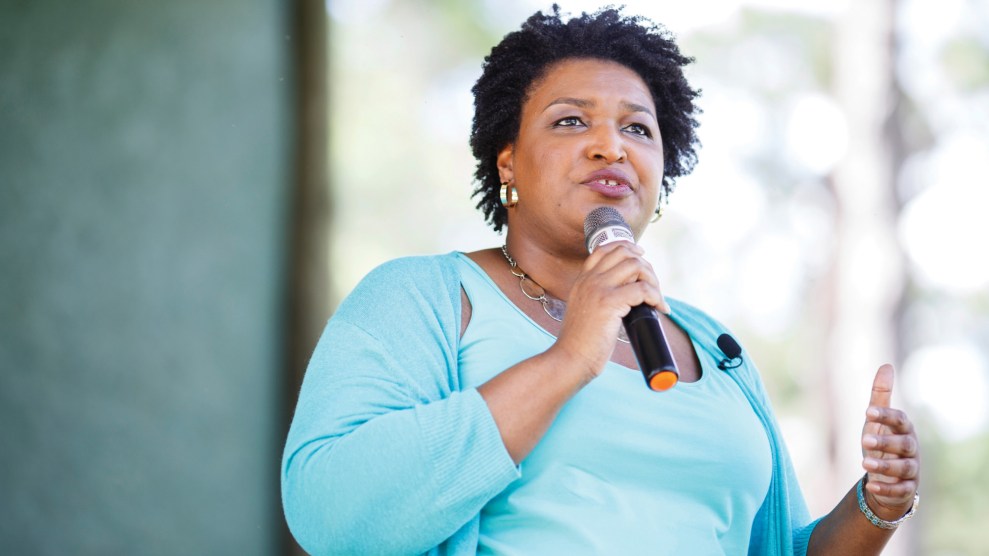
Bob Andres/ZUMA
One humid June afternoon, a group of neighbors gathered in a screened porch in Brookhaven, Georgia, to see a Democrat named Teresa Tomlinson make the case that she should be their next US senator. The neighbors, mostly senior citizens in Talbots shorts sets, sensible shoes, and name tags with names like Nancy, Gail, Herb, and Joyce, greeted each other warmly. They traded gossip about their families, many of whom grew up in this subdivision of midcentury homes and tidy yards just north of Atlanta. For them, Tomlinson was less an accomplished lawyer and now senatorial candidate than a local girl who babysat for some of their kids.
Yet even though she was one of their own, those who had gathered were not fully convinced that Tomlinson, now 54 with coiffed brown hair, lawyerly jewelry, and a polished stump speech, would be their pick. In 2017, the denizens of this conservative-leaning enclave—part of Georgia’s 6th Congressional District of about 750,000 voters—rejected progressive Jon Ossoff for Congress. In 2018 they narrowly opted to send Democrat Lucy McBath, a gun-control advocate, to Washington—by fewer than 4,000 votes.
McBath’s victory was especially remarkable for this conservative community in Atlanta, given the post–Bernie Sanders political moment that had provoked much handwringing about the creeping threat of socialism. Nevertheless, Tomlinson stood in the house where she grew up and smiled gamely at her mother and her former neighbors. “Someone here might think, ‘Well she’s a progressive, she’s a socialist,’” she said, threading the needle. “I am a progressive, but I am a pragmatic progressive.”
In April, Stacey Abrams, the Democrat star who last fall was defeated in her effort to become the first black female governor of Georgia, announced that she wouldn’t be running for the US Senate seat currently held by Republican David Perdue. Just a day later, Tomlinson, an attorney who served eight years as mayor of Columbus, Georgia’s third biggest city, declared her candidacy for a seat that has been in Republican hands for 16 years. Perdue has held the seat for four years—before him, the crusading Republican Saxby Chambliss was in office for 12 more. But Tomlinson, an eighth-generation Georgian and a former Republican who says she speaks “fluent Republican,” tells me she understands “their philosophical bent about government, so I think I’m fairly adept at being able to explain why progressive policies actually intersect with their general governing theory.”
And she thinks Georgians are ready for a change. She points to the farmers in rural parts of the state, who waited more than a year for recovery money after 2017’s punishing hurricane season. Or the many people in her state who can’t afford to see the doctor—she’s betting they’d like to see someone go to bat for universal health care. Even in a state where 96 percent of counties have no clinics that provide abortions, she’s unapologetic in her criticism of the recently proposed “heartbeat bill,” which would make it illegal for a woman to terminate a pregnancy after just six weeks of gestation, arguing that most voters don’t want it, either. But above all, she thinks she can connect with Georgians on issues rather than party affiliation, which is what the phrase “pragmatic progressive” is all about, she says.
She’ll have to make good on that intention in order to win, says Silas Lee, a pollster and sociologist at Xavier University of Louisiana. If there’s one thing the 2016 presidential election proved, he says, it’s that the biggest mistake a politician can make is to take voters for granted. “It used to be you could look at party affiliation and count on that to dictate results,” he tells me. “That’s just not true anymore.”
When Teresa Tomlinson was a child, her Brookhaven neighborhood was solidly middle class. Her parents made it there by dint of luck and hard work—her mother grew up desperately poor in rural Georgia, married Tomlinson’s father at 16, and worked in grocery stores to put him through college so he could become a mortgage broker. Tomlinson often visited her family out in the country, many of whom still struggled to climb out of poverty.
At 8 years old, she befriended a girl whose father was a state legislator. While other kids in the neighborhood were having slumber parties, she and her friend were attending political rallies, an experience that captured her imagination for the rest of her life. She began to believe that the government might be able to help people like her rural relatives, and she wanted to be part of that. As a striving undergrad at Sweet Briar College in Virginia, she joined the campus Republicans, which led to a job campaigning with Youth for Reagan in 1984. It was that year, at a workshop for young Republican operatives, that she had her first doubts about the party. “I began to become fully aware of the more doctrinal side of Republican politics,” she recalls. “It was more about power than it was about service.” When someone there suggested demonizing gay people might be a good strategy to beat liberals in elections, Tomlinson walked out.
Still, her more moderate role models—Sen. Lowell Weicker (R-Conn.) and Sen. John Warner (R-Va.)—persuaded her to remain in the party. But the last straw came in 1989, when the Supreme Court ruled on Webster v. Reproductive Health Services, upholding a Missouri law that prohibited state funds from being used for anything having to do with abortion. (That precedent laid the groundwork for the current round of increasingly restrictive state legislation.) During her first year of law school at Emory University, when George H. W. Bush cheered the decision, Tomlinson experienced a turning point in her political education and affiliations. “I was so dramatically disappointed, because I knew he and Barbara had been pro-choice,” she says. “I saw the hypocrisy of it. And I was repulsed by it and couldn’t be a part of it any longer.”
Tomlinson went on to become the first female partner of an Atlanta firm, taking on—and usually winning—high-profile corporate malfeasance cases. In 1994, she got a job at a firm in Columbus, so she moved to the small city with a population of 200,000 about 100 miles southwest of Atlanta. Tomlinson practiced law there until 2006. After several years of back-to-back high-stakes corporate cases, the firm offered Tomlinson a yearlong sabbatical. As she was preparing for it, leaders from a new local nonprofit called Midtown, Inc. asked if she would consider becoming the group’s interim executive director. She was intrigued by the group’s mission of revitalizing the city’s poor neighborhoods, so she took the position, and her sabbatical turned into a rewarding (and demanding) full-time job. By the time she decided to run for mayor four years later, her leadership at Midtown had made an impression on the movers and shakers of Columbus. She won handily and went on to serve two terms.
Tomlinson invokes her experience as mayor to suggest some of the skills she would bring to the job of US senator. Her track record in Columbus was impressive: She created an alliance of businesses, city planners, investors, and residents to clean up downtown and created a thriving business district and affordable housing. Through a crime prevention board, she rallied neighborhood associations to work with the police department, ultimately reducing crime in the city by 42 percent between 2009 and 2018. Working with the public defenders and the sheriff’s office, she reduced overcrowding in the local jails by fast-tracking all low-level felony cases.
Not everyone lauded her work. Tomlinson at times sparred with members of Columbus’ African American community—nearly half of Columbus residents are black—some of whom felt that her revitalization plans excluded them. When city officials wanted to restore a historic black entertainment district, for example, they didn’t take into account a redevelopment plan put forward by a group of black leaders. (Because of that dispute, the city ultimately decided to pull out, and that land is still dormant.) “The initiatives she put forth to revitalize downtown Columbus were marvelous, but the same was needed for the black community,” says Nathaniel Sanderson, who served as president of the Georgia branch of the National Association for the Advancement of Colored People while Tomlinson was mayor. “The only thing young black kids have to do here is play midnight basketball.”
Then there was the police shooting in 2011. Toward the end of Tomlinson’s first term, a rookie police officer mistook a young African American man named Tony Carr for a bank robber who had hijacked Carr’s car, and fatally shot him. The Georgia Bureau of Investigations cleared the officer, and the district attorney decided not to pursue the matter. Protocol forbade Tomlinson from officially intervening in the case, but black leaders wished she had spoken out more against the injustice—especially because it took the district attorney a year to publicly acknowledge that Carr was not, in fact, a bank robber. “She didn’t go out of her way to help,” Sanderson recalls.
Despite those criticisms, Tomlinson’s campaign maintains that she was actually very popular among African Americans in Columbus; her campaign points out that in her reelection in 2014, she won every black voting precinct with overwhelming margins. Still, Edward O. DuBose, who worked with Sanderson in Columbus and currently serves on the national NAACP board of directors, felt that Tomlinson was at times “completely out of touch with the African American community.” He wonders whether she has the imagination and commitment to serve Georgia’s black community as a US senator. “She would have some explaining to do” to win his vote, he says.
Tomlinson’s time as mayor gave her an important asset: name recognition among voters in south and central Georgia, who have resisted Democratic candidates. Case in point: Last fall, Stacey Abrams won metro Atlanta handily, but in the more rural parts of the state, Brian Kemp crushed her. Tomlinson plans to campaign heavily outside of Atlanta—and especially in her former stomping grounds—in hopes of mobilizing more rural Democrats. Considering Abrams only lost by 54,000 votes out of nearly 4 million votes cast, a few more rural supporters could make the difference. Seth Clark, a Democratic strategist based in the central Georgia city of Macon, agrees. He says that in the past, both parties have assumed these areas would automatically go Republican and concentrated their campaigns elsewhere. But he believes that party affiliation isn’t as important to many of those voters as Atlanta-based politicians might think. Voters outside Atlanta, he says, “are worried about their schools, about their farms. People don’t think progressive or conservative on things like this. Tomlinson understands that.”
Lee, the Xavier University pollster, says that insight could be key to her success—even against popular, incumbent Perdue. “Georgia is not a monolith in terms of ideology and demographics,” he says. “People are sick of just being seen as Democrats or Republicans, conservatives or liberals. We’re more complicated than that.”
That may be true in metro Atlanta as well. At the Brookhaven event, most of the attendees I spoke with said they were registered Republicans—and, despite party lines, intrigued by Tomlinson’s ideas. This was a far cry from the resistance crowd: One woman opined that she thought Hillary Clinton had lost because of her “very obnoxious voice” that was off-putting to men. Still, there was something about Tomlinson’s evenhanded approach that appealed to them. They nodded as she talked about how it was impossible to talk about infrastructure without considering the impact of climate change, and they murmured approvingly when she pointed out that universal health care would save taxpayers money in the long run.
After Tomlinson finished speaking, I struck up a conversation with a 70-year-old Republican retiree named DeeDee Burton, who had lived her whole life in Atlanta and its suburbs. She was fed up with Washington politicians of both parties, she said, and although she had voted for Republican Brian Kemp for governor, his support for the “heartbeat bill” deeply disappointed her for many reasons—one that had nothing with a woman’s right to choose. As a former business owner—she ran a furniture and fabric supply firm for 30 years—she worried that the legislation might alienate companies. In particular, she worried about film industry execs’ threats to take their business elsewhere. “He should have had the vision to know what his stance was going to do to our commerce,” she said.
Another attendee, Kay Damerow, 64, had voted for Donald Trump for president and Brian Kemp for governor, but said that Tomlinson’s approach appealed to her. “There’s a lot of things about the Republican ways of doing things—they’re like old white men’s politics.” Take abortion, for example. “Man,” she said, shaking her head. “You can’t take my rights away!”
The Brookhaven crowd’s enthusiasm may be an encouraging sign for Tomlinson, but the primary field is bound to get more crowded. Former lieutenant governor hopeful and trucking company executive Sarah Riggs Amico is expected to enter the race, and there are rumors that Jon Ossoff will, too. Even if Tomlinson clinches the primary, which will take place in March, her moderate, incumbent opponent, David Perdue, will be tough to unseat. Clark, the Macon strategist, believes that if she can extend her reach beyond Atlanta, she’ll have a shot. The Republicans have “abandoned any kind of cross-party appeal,” he says. “When you look at the measures that are coming out of the Georgia Republican party, this is not moderate.” And that, he believes, will alienate more people than Republicans might realize.
Just ask Sanderson, the former Columbus NAACP president who criticized Tomlinson over her treatment of the African American community. “I’m a conservative, I’m a Republican,” he says. “But the way that Mitch McConnell has been acting, I don’t want to see David Perdue go back up there and give him power. It’s a nail-biter, but I’d vote for her. Because I know what’s at stake.”
This article has been updated.















